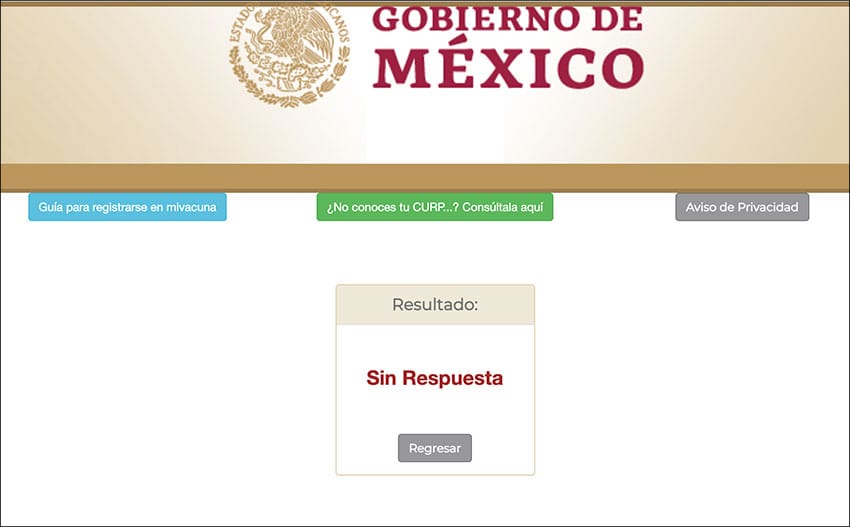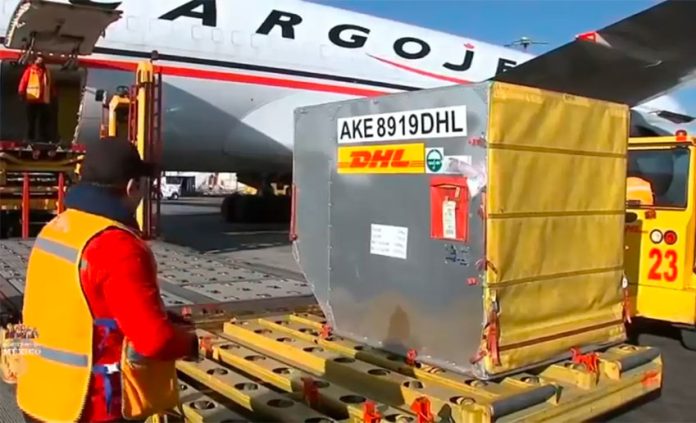The website set up by the federal government for the registration of seniors who want to be vaccinated against Covid-19 experienced problems for a fourth consecutive day on Friday amid growing concern about Mexico’s capacity to administer a second shot of the Pfizer vaccine to health workers within the required timeframe.
The government launched an online platform Tuesday where people aged 60 and over can register for a vaccination appointment. But the site – mivacuna.salud.gob.mx – was quickly overwhelmed, leaving many unable to access it.
The Associated Press (AP) reported that problems persisted on Wednesday and Thursday. Federal authorities said a high volume of traffic overloaded the site and its servers and recommended that people be patient and continue trying to register.
According to AP, anyone trying to access the site earlier this week had to pass an English language CAPTCHA “I am not a robot” test just to find out that it wasn’t working. The news agency said the site was loading on Wednesday but returning a server error message.
“The holdup now appears in the link to another government agency that has to check official ID numbers. That agency spends hours ‘checking’ registration requests, only to return a message of ‘no response,’” AP said.
On Thursday, the site began to work but it was still functioning well below an optimal level. But on Friday, three attempts by Mexico News Daily failed to get beyond a message saying “Sin respuesta” (no answer) after entering a CURP identity number.
Writing in the newspaper El Universal, columnist Hectór de Mauleón described a 20-hour ordeal trying to get the website to work.
“They [the government] had months to prepare for the demand that would happen, but as always, they didn’t do it,” he wrote.
Interior Minister Olga Sánchez acknowledged the website issues, attributing them to “the great hopes of getting registered for a vaccine.” She asserted that the overload will not affect the government’s vaccination program.
But there is already significant concern about the vaccine rollout, which began on December 24 with the inoculation of frontline healthcare workers but has not yet reached other sectors of the population apart from teachers in Campeche and some government vaccination brigade workers.
Just over 695,000 doses of the Pfizer/BioNTech vaccine had been administered by Thursday night, according to Health Ministry data, but fewer than 61,000 of those doses were used as the second of the required two shots.

More than 617,000 health workers still require a second shot but there are currently only about 71,000 doses of the Pfizer vaccine in the country. At least two shipments of Pfizer vaccines are expected later this month but how many doses will arrive has not been revealed.
The situation has triggered complaints from doctors, nurses and other health workers on the frontline of the fight against Covid-19, which has claimed the lives of more than 160,000 Mexicans, including more than 2,000 medical personnel.
Some workers say that the 21 days within which Pfizer recommends the second dose of the vaccine be administered has already passed for them.
Deputy Health Minister Hugo López-Gatell, the government’s coronavirus point man, has said that the second dose can be administered up to 42 days after the first according to World Health Organization guidelines but it appears unlikely that Mexico will be able to meet that timetable for all those who have received one shot to date.
In that context, some state governors on Thursday urged the federal government to provide certainty about the delivery and application of second vaccine doses for health workers. However, it wasn’t fully able to satisfy their demand.
At a virtual meeting with Interior Minister Sánchez and Deputy Health Minister López-Gatell, the governors of Sonora, Guerrero and Yucatán conveyed the concerns of health workers, the newspaper El Universal reported.
They, and other state leaders, also asked questions about what impact not receiving a second dose within the required timeframe will have on people’s immunity.
Yucatán Governor Mauricio Vila said federal officials indicated that shipments of Pfizer vaccines will arrive on February 15 and 22 and that there will be enough to administer second doses to all health workers this month.
Sánchez said Friday that López-Gatell provided the governors with a guarantee that health workers will receive their second shot on time, although it is far from certain it will be possible given that the vast majority have only received one shot so far and that 53 days will have elapsed since the start of the vaccination program by the time the next Pfizer shipment arrives.
Vila appeared to express skepticism, noting that the officials “never said how many vaccines [will arrive].”
Quintana Roo Governor Carlos Joaquín told El Universal that there is no guarantee that vaccines for the inoculation of the nation’s 15.4 million seniors will arrive this month, although President López Obrador predicted that 6 million doses would arrive in February.
A senior health official said last week that 200,000 doses of Russia’s Sputnik V vaccine, of which Mexico intends to purchase 24 million doses, would arrive this week but that shipment appears to have been delayed.
Joaquín said the meeting with Sánchez and López-Gatell failed to give him peace of mind about the rollout of vaccines in Quintana Roo and the rest of the country because “there are no complete guarantees or concrete dates.”
“The second doses [for health workers] are going to arrive on the 15th [of February] but we don’t know exactly how many. Afterwards the AstraZeneca vaccines are going to arrive but we don’t have the exact starting date for their use. The Sputnik vaccines are going to arrive but we don’t yet have the arrival schedule. So, there is clearly no guarantee with regard to the dates,” he said.
Vila acknowledged that other countries have also experienced delays in receiving vaccine shipments – Pfizer temporarily halted production at its Belgium plant in order to to boost production, causing delays – and called on all levels of government to work together to ensure the success of the national vaccination program.
“Hopefully, the vaccines arrive soon and we can all have the certainty we desire,” he said.
Source: AP (en), El Universal (sp)
